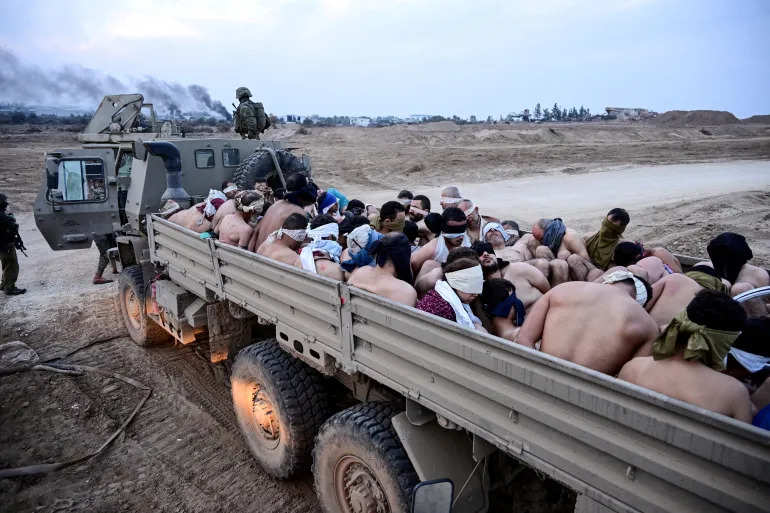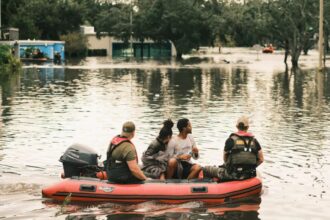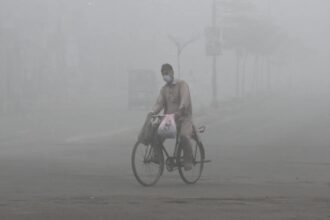A recent report from the United Nations Human Rights Office has raised grave concerns about the treatment of thousands of Palestinians who have been forcibly removed from Gaza and detained in Israel since the outbreak of the conflict on October 7. The report, released on Tuesday, alleges that many detainees have been subjected to severe mistreatment, including torture, with dozens reportedly dying in custody.
Forced detention and alleged abuse
According to the 23-page report, based on interviews with released detainees, victims, and witnesses, many Palestinians were taken at checkpoints as they fled the ongoing military offensive or were seized from schools and hospitals where they sought shelter. The report describes harrowing conditions, including detainees being blindfolded, shackled, and transported to Israel in “cage-like” military centers, where they were often left wearing nothing but diapers for extended periods.
The UN report claims that 53 detainees have died while in Israeli custody. The testimonies gathered indicate a range of appalling acts, such as waterboarding, the release of dogs on detainees, and other forms of abuse that violate international human rights and humanitarian law.
United Nations High Commissioner Volker Turk commented on the findings, saying, “The testimonies gathered by my Office and other entities indicate a range of appalling acts, in flagrant violation of international human rights law and international humanitarian law.” Turk has called for the immediate release of all detainees, as well as the remaining hostages taken during the October 7 attacks in Israel.
Israeli response and international reactions
The Israeli military has acknowledged that it is investigating allegations of detainee mistreatment but has declined to comment on specific cases. The military also announced plans to phase out the Sde Teiman camp in the Negev desert, which has been cited both in the UN report and by Palestinian rights groups as a site of alleged abuse.
The issue of detainee treatment is adding to the mounting international pressure on Israel over its conduct in Gaza. In May, the U.S. State Department expressed concern over allegations of Israeli abuse of Palestinian detainees and indicated that it was looking into the matter. The allegations have also sparked domestic tensions within Israel, with right-wing protesters this week breaking into military compounds where soldiers were due to be questioned as part of an investigation into alleged abuse of a Palestinian detainee.
Dire conditions for detainees and hostages
The report highlights the dire conditions faced by Palestinian detainees, who are mostly men and boys, and include residents, doctors, nurses, and patients, as well as captured Palestinian fighters. The report also mentions instances of sexual violence, though it does not specify the number of incidents. The detainees were generally held in secret, without being informed of the reasons for their detention or given access to legal representation.
The report also touches on the difficult conditions endured by Israeli hostages in Gaza, citing testimonies from those who have been freed. These hostages reportedly suffered from a lack of fresh air, sunlight, and were subjected to beatings.
Ongoing concerns and calls for action
The UN report, which has been shared with both the Israeli government and Palestinian authorities, did not specify how many detainees have since been released, with a UN spokesperson stating that it was impossible to determine the exact number.
Forced detention and alleged abuse
According to the 23-page report, based on interviews with released detainees, victims, and witnesses, many Palestinians were taken at checkpoints as they fled the ongoing military offensive or were seized from schools and hospitals where they sought shelter. The report describes harrowing conditions, including detainees being blindfolded, shackled, and transported to Israel in “cage-like” military centers, where they were often left wearing nothing but diapers for extended periods.
The UN report claims that 53 detainees have died while in Israeli custody. The testimonies gathered indicate a range of appalling acts, such as waterboarding, the release of dogs on detainees, and other forms of abuse that violate international human rights and humanitarian law.
United Nations High Commissioner Volker Turk commented on the findings, saying, “The testimonies gathered by my Office and other entities indicate a range of appalling acts, in flagrant violation of international human rights law and international humanitarian law.” Turk has called for the immediate release of all detainees, as well as the remaining hostages taken during the October 7 attacks in Israel.
Israeli response and international reactions
The Israeli military has acknowledged that it is investigating allegations of detainee mistreatment but has declined to comment on specific cases. The military also announced plans to phase out the Sde Teiman camp in the Negev desert, which has been cited both in the UN report and by Palestinian rights groups as a site of alleged abuse.
The issue of detainee treatment is adding to the mounting international pressure on Israel over its conduct in Gaza. In May, the U.S. State Department expressed concern over allegations of Israeli abuse of Palestinian detainees and indicated that it was looking into the matter. The allegations have also sparked domestic tensions within Israel, with right-wing protesters this week breaking into military compounds where soldiers were due to be questioned as part of an investigation into alleged abuse of a Palestinian detainee.
Dire conditions for detainees and hostages
The report highlights the dire conditions faced by Palestinian detainees, who are mostly men and boys, and include residents, doctors, nurses, and patients, as well as captured Palestinian fighters. The report also mentions instances of sexual violence, though it does not specify the number of incidents. The detainees were generally held in secret, without being informed of the reasons for their detention or given access to legal representation.
The report also touches on the difficult conditions endured by Israeli hostages in Gaza, citing testimonies from those who have been freed. These hostages reportedly suffered from a lack of fresh air, sunlight, and were subjected to beatings.
Ongoing concerns and calls for action
The UN report, which has been shared with both the Israeli government and Palestinian authorities, did not specify how many detainees have since been released, with a UN spokesperson stating that it was impossible to determine the exact number.
Source : Times of India






